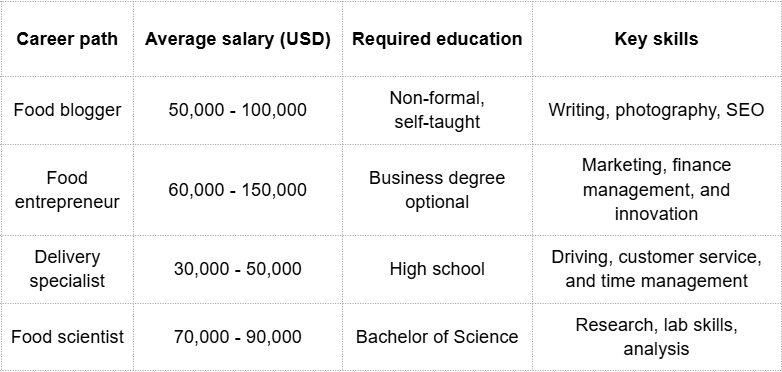Out in the food world, there are only a limited number of things to do beyond following the directions in the cookbook. When we usually consider the kitchen, we are imagining it as the place where we prepare dinner, but in reality, it can be a starting point of a new hobby or even of an entire career, which involves food. Your cooking hobby can be developed into a delivery job where you can discover new flavors and experiences day by day, into blogging, or even into entrepreneurship. Simply put, food is not only food but also new possibilities. That is why, in this paper, we will discuss how you can leave recipe books behind and establish yourself in the food industry.

Unlocking Hidden Careers in Food
The food sector provides numerous careers that are not necessarily those of a chef or restaurateur. There are careers in food science, in which experts come up with new products, or in agronomy, plant farming. Food technologists, for instance, enhance the taste and safety of foods, while quality managers make sure everything is standard. These jobs typically call for a science or business degree, but most begin with the basics. In the US, the median food scientist salary is about $74,000 annually, which, let's be honest, isn't too shabby.

But if you're after something flashier, take a glance at takeaway delivery driver jobs, particularly in British cities like Leeds, where the takeaway trade is actually expanding. These vacancies are getting ever more popular among people who would appreciate having an adaptable working schedule and daily contact with customers. Vacancy aggregator Jooble harvests such job postings from more than 140,000 sources in 66 countries and features 300,000 new jobs every day, and serves up to one million members who search for employment on a daily basis. The platform has 90 million applicants visiting monthly, employs verified listings free of spam, and facilitates easy discovery of an ideal delivery gig.
Food Blogging and Content Creation
Food blogging has been a career in its own right for some time now. American food bloggers are making up to $50,000 annually through advertising and sponsorships from home, tasting food products, and taking pictures of them for social media. It's particularly cool these days because bloggers are celebrating seasonally available ingredients, minimizing waste, and providing green cooking tips, which appeals to members of the audience who are eco-conscious.
Below are some of the best benefits of food blogging:
- A group of individuals who exchange recipes and tips;
- A lifestyle in which you are able to balance blogging with other work;
- Monetization opportunities through sponsorship and ads that increase your following and open up new channels.
Most bloggers, by the way, start out as a pastime but grow into thriving companies with brand sponsorships. All it takes is a simple site or platform like WordPress, where aesthetics and personal story are where it's at. Content inspiration is also at your fingertips. Take a glance at the best cooking shows on Netflix for advice that will have you seeing and sparking ideas.
Entrepreneurship: Kitchen To Business Empire
But if the above options are not for you or you envision bigger returns with exponential growth potential down the line, you may want to turn to entrepreneurship. In the food industry, it might unexpectedly start with some inspiration from personal kitchen experience. Nowadays, food delivery businesses and entrepreneurs have over 20 lucrative ideas, from specialty services to mobile applications. The United States food industry brings trillions of dollars, with a massive emphasis on technology, such as ghost kitchens that keep their expenditure low through focusing on deliveries.
Small companies will be founded on niche products like organic spices or vegetable snacks, and roughly 70% will make it through the initial years due to online revenue. Naturally, a strong advertising campaign is essential, particularly one that includes social media, and growth will most likely feature using green practices, i.e., purchasing from local vendors.
Sustainable and Educational Paths
If you want more of the scientific and community lab, then food sustainability is the place to go and specialize in waste reduction and seasonal consumption. Information on sustainable consumption assists home cooks in making a contribution to green initiatives in the U.S., such as through the USDA. They advocate for programs within sustainable agriculture, where one can have career opportunities as an environmental consultant.
In addition, educational paths such as food science courses lead to research positions. Naturally, jobs such as health coach require nutrition expertise, with base salaries of $45,000. Whether or not that's much or little is up to you, but if your interest lies truly in this kind of work, then the matter of compensation likely becomes secondary.
Final Thoughts
Stepping outside the cookbook shows us just how varied food really is. Beyond recipes and measurements lies a world shaped by creativity, culture, and human connection. From writing to delivery, from photography to restaurant management, every turn can lead us to a fulfilling career that blends passion with purpose. The beauty of this path is that it welcomes everyone – whether you start by sharing homemade meals, documenting your culinary journey online, or helping others discover new flavors. Ultimately, however, it's all about starting small and allowing your love to carry you to bigger things. Because love for food isn’t just about taste, it’s about curiosity, discovery, and the joy of sharing. After all, it’s this love that makes life richer, turning food into more than nourishment: it becomes a story, a craft, and a road to new horizons.


